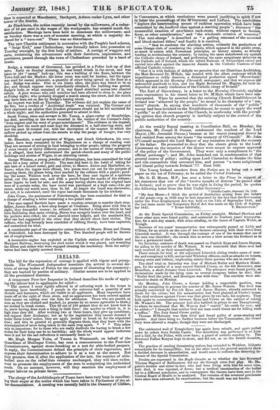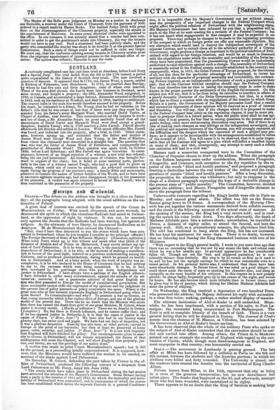IRELAND.
The bill for the repression of outrage is applied with vigour and promp- titude. The Westmeath Independent mentions the arrival in several dis- tricts of strong bodies of Police for the purpose of disarming the peasantry: they are backed by parties of military. Similar means are to be applied to all the proclaimed districts.
A temporary Poor-law Inspector in Ireland describes his mode of apply- ing the labour-test to applicants for relief— The system I most rigidly adhered to of enforcing work in the house is operating most beneficially. I parade in the entrance-hall a quantity of new shovels and hammers, which are visible to all applicants. Many impostors have made off at the sight of them alone, and no appearance has been entered against their names on calling over the lists for admission. Those who are passed, as soon as they are clothed and washed, (a process by no means agreeable to them,) are invited to break stones. This 99 out of 100 protest they do not know how to do, never having done such a thing in their lives: the answer to which is, it is high time they did. After working two or three hours, they give up sometimes, and request their discharge; but as by the regulations they cannot demand it under three hours' notice, they are again invited to break on for the stipulated time; and this in general so generally disgusts them, that they leave with the determination of never being taken in the same trap again. * • • This refers only to impostors; for to those who are really destitute the having to break a few Stones for their keep can be no hardship; and the whole would appear ludicrous were it not for the sad reflections it necessarily leads to."
Mr. Hugh Morgan Tuite, of Tooma in Westmeath, on behalf of the Guardians of Mullingar Union, has sent a remonstrance to the Poor-law Commissioners, against stone-breaking as a test for able-bodied paupers. In reply, the Commissioners defend the principle of their regulation, and express their determination to adhere to it as a test at the outset. But they promise, that if, after the application of the test, the number of able- bodied men on the relief-lists remains unchanged, they will then endea- vour to promote the employment of the men in completing the unfinished roads. On no account, however, will they sanction the employment of pauper labour on private farms.
The clergy of the Archbishopric of Tuam have been very busy in manifest- ing their anger at the notice which has been taken in Parliament of the al- tar-denunciations. A meeting was recently held in the Deanery of Clifden, in Connemara, at which resolutions were passed justifying in spirit if not in letter the proceedings of the M'Dermotts and Laffans. The resolutions "deplore the heartrending scenes of ruthless oppression which have been committed by the landlord class against a starving people "; denounce "the unmerciful exaction of exorbitant rack-rents, without regard to famine, fever, or other consideration," and "the wholesale eviction of teuantry." " The rent-charge" is described as "a galling remnant of the accursed and blood-stained tithes," and finally it is resolved, "that we condemn the alarming notices, evidently the productions of some Orange club, of murdering the priests, which appeared in the public press, so much in unison with Protestant principles, as history attests, as directly tending to revolutiouize the country, by raising the same unhallowed cry against the Catholic clergy of Ireland, and performing the same sanguinary atrocities on the Catholic soil of Ireland, which the infidel Radicals of Switzerland raised and carried into effect against the innocent Jesuits in the Catholic Cantons of that afflicted Catholic country. "that it is with feelings of delight we perceive that our illustrious Archbishop, the Most Reverend Dr. M'Hale, has treated with the silent contempt which its impertinence so richly deserves, a dictatorial production signed Shrewsbury/ which appeared in the Morning Chronicle newspaper; • and that we express our unbounded gratitude to him, and the Right Reverend Dr. Magian, for their in- dependent and manly vindication of the Catholic clergy of Ireland."
The Earl of Shrewsbury, in a letter to the Morning Chronicle, wising some expressions in his recent letter to Dr. *Hale which have been to- interpreted. When he asserted that the existing Church Establishment in Ireland was "abhorred by the people," he meant in its character of a" ma- terial" church. In saying that hundreds of thousands of the "public" money had been lavished on the Establishment, he meant to apply the word " public" to all the revenues of the Church, in conformity with the prevail- ing opinion that church property is lawfully subject to the control of' the public authorities of the country.
At the weekly Repeal meeting in Conciliation Hall, on Monday, the chairman, Mr. Joseph H. Dunne condemned the conduct of the Lord Mayor, (Mr. Jeremiah Dunne,) because at his recent inaugural dinner he had omitted from among the toasts "the memory of O'Connell." Mr. John O'Connell acquitted the Lord Mayor of any intention to slight the memory of his father. He proceeded to deny that the cheers given to the Lord- Lieutenant on the occasion of the dinner were meant to express approval of the policy of the Government. They were only a compliment to "the official personage "; and Mr. John launched out in condemnation of that general course of policy; calling upon Lord Clarendon to dismiss the false and vile counsellors that surround him, and pursue "a more enlightened and liberal policy towards Ireland."!!! Rent 1051.
The Young Ireland seceders from the Nation are to bring out a new paper on the 1st of February, to be called the United Irishman.
Mr. G. H. Moore, M.P., has sent a letter to the Times in support of, his statement that out of the "twelve months of distress " he passed nine in Ireland; and to prove that he was right in fixing the period, he quotes the following letter from the Irish Under-Secretary- "Dublin Castle, January 13, 1848.
"My dear Moore—I think the period of destitution arising from the failure of the potato crop in 1846 may be best measured by the fact that the first session under the Poor-Employment Act was held on the 14th of September 1846, and the last issue under the Temporary Reid Act was made on the 11th of Septem- ber 1817. "Yours faithfully, T. REDINGTON."
At the Ennis Special Commission, on Friday sennight, Michael Skeehan and three other men were found guilty, and sentenced to fourteen years' transporta- tion, for a mid-day attack, with arms-stealing, on the house of Captain Walsh, at Trough. Sentence of ten years' transportation was subsequently passed on Liddy and O'Brien, for an attack on the cars of two farmers returning with their wives from Limerick market. It was through the courage of one of the women that one of the men was identified: she struck him so severe a blow across the forehead as to leave a permanent mark.
On Saturday, sentence of death was passed on Patrick Ryan and James Haynes, for aiding in the murder of Mr. Watson. It was rumoured that these men had each received Si. as their assassination-fee.
There remain for trial at the adjourned Limerick sitting twelve cases of mur- der and conspiracy to kill; and several Whiteboy offences, such as attacks on homes, seizing arms and robbery, implicating ninety-three persons who are in custody.
The chief trial on Saturday was that of Michael Butler and Matthew liouri- gan, for the murder of a man named Patrick Cleary, on the 6th November, near Broadfoot, a short distance from Limerick. The prisoners were found guilty, on declarations made by the dying man on several occasions before he died, that "Butler fired the pistol, and Hourigan was with him." The convicts were sen- tenced to death on Monday.
On Monday:, John Crowe, a farmer holding a respectable position, was tried for conspiring to procure the murder of Mr. James Watson. The deed was actually committed by Pat, ick Ryan and James Haynes, already sentenced to death for the crime; but the assassination had been planned at Crowe's house. The chief evidence against Crowe was that given by two lads, his nephews. They both spoke to conversations between Ryan and Crowe on the subject of taking Mr. Watson's life. The prisoner had also babbled in prison to one Shaughnessy, to whom he mentioned that Mr. Watson had "canted" his cattle for rent; and he added—" I thought that neither God nor man could blame me for killing such a ruffian." The Jury found Crowe guilty. Thomas MIlahoney was then tried and found guilty of arms-stealing and murder. And there being no further business before the Commission, the Grand Jury were allowed a respite, though they were not discharged.
The celebrated wall of Templederry has again been rebuilt, and again pulled down by orders from Dublin Castle. The demolition was performed in an hour and a half, by the Police, with crow-bars • a guard of soldiers standing by. The Reverend Father Kenyon kept in-doors, slid did not, as on the former occasion, scold.
The practice of sending threatening notices has extended to Wicklow, hitherto remarkable for its tranquillity; but on the other hand, the general accounts show a decided decrease in assassination, and would seem to indicate the deterring in- fluence of the Special Commission.
Doubts are expressed in the Boyle Gazette as to whether the late Reverend Thomas Maguire of Ballinamore did not die through some foul play. Mr. Ms- guire's brother and sister-in-law, who had been living with him for some time, both died, it was reported, of fever; but a medical examination of the bodies led to a different conclusion' and in consequence the viscera have been sent to the Central Board of Health to be analyzed. The remains of the reverend gentleman have since been exhumed, for examination; but the result was not known. The Master of the Rolls gave judgment on Monday on a motion to discharge one Reynolds, a receiver under the Court of Chancery, from the payment of 9001. ordered in a report made by Master Rooks. The learned Judge dwelt with great fore, on the mismanagement of the Chancery property, especially the abuses in the appointment of Receivers. In some case; attoraies' clerks were appointed to the office. In one instance, it was actually stated that a murder had been com- mitted in order to get the gentleman's estate into Chancery, the way the tenants would not have to pay rent. Such a statement had been publicly made, and the party who committed the murder was about to be tried for it at the present Special Commission. Such a state of things could not be suffered to exist any longer. He must say, that the confusion existing among tenants in Chancery estates arose from the improper appointment of ignorant persons to the important office of re- ceiver. The motion was refused; Reynolds to pay the costs.



























 Previous page
Previous page